|
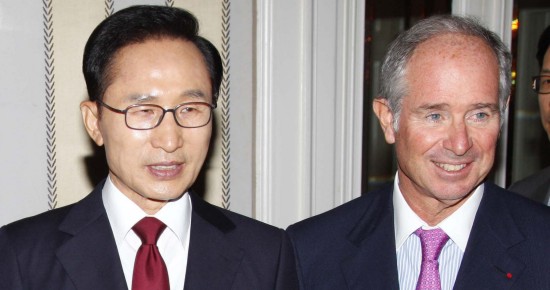
Lee Myung-bak, South Korea president, and
Stephen A. Schwarzman, co-founder, chairman and
CEO of the
Blackstone Group
|
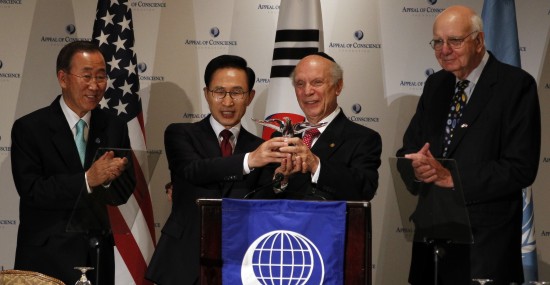
Rabbi Arthur Schneier and Paul Volcker, at
right, present award to
South Korea President Lee Myung-bak, with UN
Secretary General Ban Ki-moon at left |
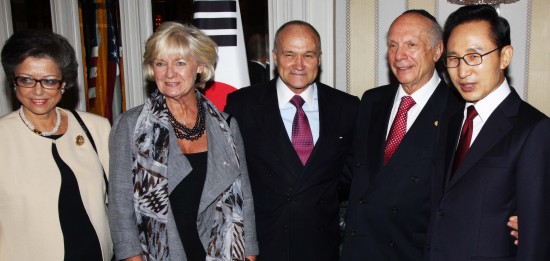
Elisabeth Schneier, Veronica Kelly and
husband Police Commissioner Raymond Kelly,
Rabbi Arthur Schneier,
and Lee Myung-bak |
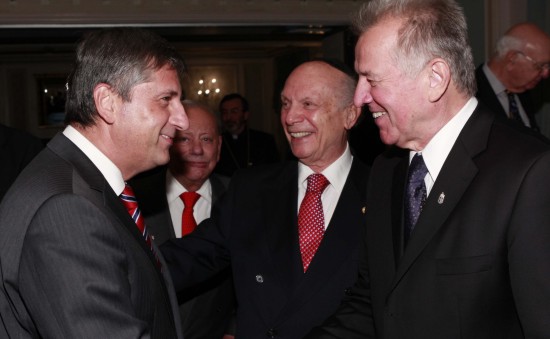
Rabbi Arthur Schneier introduces Michael
Spindelegger (left), Vice Chancellor and Minister of
Foreign
Affairs of Austria, to Hungary President Pal
Schmitt |
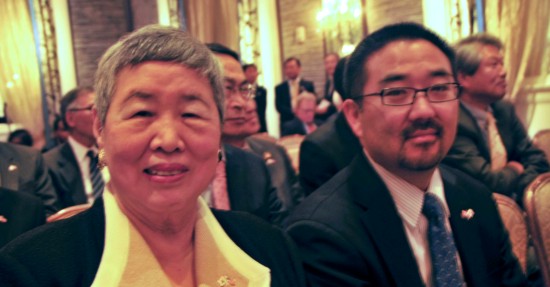
Hesung Chun Koh (left),
founding chair of East Rock Institute of New
Haven, Conn., and
Dr. Christopher Y. Park,
president |
APPEAL OF CONSCIENCE
He Survived With The Aid Of Strangers,
Now Wants To Give Back To The World
STORY AND PHOTOS BY TIM BOXER
HEN Korea gained independence after
the Second World War ended in 1945, the biggest challenge the people
faced was poverty. This was one of the poorest countries in the
world.
Lee Myung-bak, four years old at the time,
lived with his family in a shanty. "There were many days I had to
satisfy my hunger by filling myself with nothing but water." All day
long he watched people fighting, heard children crying, and saw the
sick dying. He realized poverty can crush a human being, even kill a
human soul. That was Korea 60 years ago.
He worked hard. A shopkeeper lent him
books; another gave him a job as a garbage collector. "Were it not
for these people’s generosity, I wouldn’t have been able to go to
college."
Education helped him escape poverty.
"To my
parents, being poor was never an excuse to deny their children the
right to quality education. To this day, parents in Korea do not
hesitate when investing in their children’s education. This is what
made Korea."
To what end? Myung-bak got his education;
in the ‘60s he was a student leader of demonstrations calling for
the end of dictatorship. He endured prison for his pro-democracy
activism.
Today, at age 70, Myung-bak is the 17th
president of South Korea. He was honored with the 2011 World
Statesman Award by the Appeal of Conscience Foundation in September
at the Waldorf-Astoria in New York.
Rabbi Arthur Schneier, founding president
of the Appeal, and Paul A. Volcker, former Federal Reserve chairman,
made the presentation. A fellow Korean, UN Secretary General Ban
Ki-moon, added his greetings.
Of all the countries that gained
independence following the Second World War, Myung-bak said, only
Korea was able to transform from a recipient country to a donor
country.
"A boy who once received aid from others
is standing before you as the president of a country that is now
able to give to others."
The Korean poverty stricken lad, who used
education as the key to upward mobility, and made good as the leader
of his people, vowed to help other people achieve similar success in
their lives. "Too many of our young men and women are denied the
opportunity to pursue their dreams," he said.
He proposed a solution called
"eco-systemic development." He said it’s "a new vision for the
future where we all strive towards a win-win society…where every
member contributes and cooperates with one another…It is like in the
natural world where there exists fierce competition also cooperation
that benefits all parties. Such diversity is what achieves
equilibrium and co-prosperity."